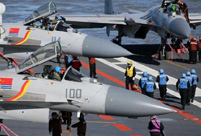


Illustration: Shen Lan/GT
The first meeting of the Quadrilateral Coordination Group (QCG) of Afghanistan, Pakistan, China and the US was held in Islamabad, Pakistan on January 11. The four parties agreed to dedicate themselves to an Afghan-led and Afghan-owned peace and reconciliation process and pushed to restart direct talks between the Afghan government and the Taliban. On January 18, the QCG held their second meeting in Kabul, during which they discussed the roadmap for peace talks between the Afghan government and the Taliban.
The emergence of the QCG is attributed to the situation in Afghanistan. Since the Afghan government of unity was established, President Ashraf Ghani has been advancing the peace process in the country and made some progress. But due to global economic shrinkage and domestic political instability, the unity government met enormous challenges in 2015.
In December, the UN's Human Development Office ranked Afghanistan 171, out of 188 countries, in the human development index. It is the least developed country in Asia with high unemployment of 40 percent.
Meanwhile, domestic security is still tough. According to a recent Pentagon report, about 16,000 Afghan soldiers were killed or wounded in 2015, a 28 percent increase compared with 2014. Official Afghan figures show that about 110 people were kidnapped by armed groups in 2015 and 21 of them have been killed. The peace process encountered a deadlock in 2015 and needs a new coordination system.
Therefore without a helping hand from the international community, the unity government led by Ghani is not capable of tackling these challenges.
Then why can the QCG push forward the peace process in Afghanistan? First, reconciliation in Afghanistan serves the fundamental interests of all parties involved. In the joint statement released after the first meeting, all countries underscored the importance of bringing an end to the conflict and emphasized their determination to push forward efforts.
Second, any international institutions can form a certain form of common power and the key is whether the power has binding power. Such binding power can be imposed by big powers. The participation of China and the US can exert some influence on the common power of the QCG. Third, the QCG provides a platform for the Afghan government and the Taliban to talk. Currently, the Afghan Taliban controls the wide rural area of southeastern and southern Afghanistan. The country's peace process cannot live without the participation of the Taliban.
There are a number of highlights in the first meeting of the QCG, one of which is China's active involvement. It has been 60 years since China and Afghanistan established diplomatic ties and the two have become strategic partners. China plays a constructive role in Afghanistan's peace-building process. In late 2014, China pledged to give Afghanistan $327 million in aid through 2017.
As a friendly neighbor of Afghanistan and a responsible power, China is obliged to advance Afghanistan's reconciliation process. China's participation in the QCG can help both China and the US utilize their own diplomatic resources and mobilize countries such as Pakistan and India to play more roles.
It can also help improve relations between Afghanistan and Pakistan and enhance mutual trust between the two, paving a favorable environment for the peace process. Besides, the development of Afghanistan and Pakistan, which can be achieved through China's Silk Road economic belt proposal, will accelerate reconciliation.
However, uncertainties remain. Can the QCG maintain a solid and sustainable basis for cooperation? Can the four parties solve the problems in time? Can the consensus be implemented? The proper function of the QCG requires joint efforts.
 A foreign girl explains what China should be proud of
A foreign girl explains what China should be proud of Chinese navy's air-cushioned landing craft in pictures
Chinese navy's air-cushioned landing craft in pictures Chinese pole dancing master opens class in Tianjin
Chinese pole dancing master opens class in Tianjin PLA holds joint air-ground military drill
PLA holds joint air-ground military drill Charming female soldiers on Xisha Islands
Charming female soldiers on Xisha Islands Beautiful skiers wear shorts in snow
Beautiful skiers wear shorts in snow Getting close to the crew on China's aircraft carrier
Getting close to the crew on China's aircraft carrier Chinese stewardess celebrate test flight at Nansha Islands
Chinese stewardess celebrate test flight at Nansha Islands Pentagonal Mart becomes the largest vacant building in Shanghai
Pentagonal Mart becomes the largest vacant building in Shanghai Top 20 hottest women in the world in 2014
Top 20 hottest women in the world in 2014 Top 10 hardest languages to learn
Top 10 hardest languages to learn 10 Chinese female stars with most beautiful faces
10 Chinese female stars with most beautiful faces China’s Top 10 Unique Bridges, Highways and Roads
China’s Top 10 Unique Bridges, Highways and Roads Virtual reality takes porn ‘to the next level’
Virtual reality takes porn ‘to the next level’ Online spat won’t hinder cross-Straits ties
Online spat won’t hinder cross-Straits ties A look behind the scenes at China’s censorship watchdog
A look behind the scenes at China’s censorship watchdog $93m gay app deal raises questions over future of LGBT services
$93m gay app deal raises questions over future of LGBT servicesDay|Week